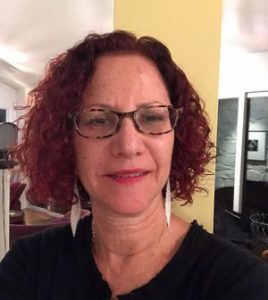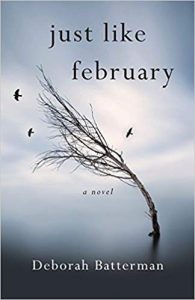Deborah Batterman Interview
 Deborah Batterman is the author of Just Like February (a novel), Shoes Hair Nails (short stories), and Because my name is mother (essays). She is a Pushcart nominee, and her award-winning stories and essays have appeared in anthologies as well as print and online literary journals. A native New Yorker, she has worked over the years as a writer, editor, and teaching artist. We’re delighted to feature this interview with her!
Deborah Batterman is the author of Just Like February (a novel), Shoes Hair Nails (short stories), and Because my name is mother (essays). She is a Pushcart nominee, and her award-winning stories and essays have appeared in anthologies as well as print and online literary journals. A native New Yorker, she has worked over the years as a writer, editor, and teaching artist. We’re delighted to feature this interview with her!
Where did you grow up? How did your childhood impact the writer you’ve become? Did you always want to be a writer?
I grew up in Brooklyn, in an ethnically mixed neighborhood. We—my mother, father, brother, grandmother, and I—lived in a two-bedroom apartment in a middle-income housing project. On any given night of the week, and certainly during the Jewish holidays, aunts, uncles, and cousins would be sitting around the kitchen table or in the living room.
When I think back to those times, I see myself retreating into my bedroom to read or listen to music—my way of escaping the noise. Then I see myself heading back to the noise, to listen in. The daily dramas at the heart of it all – love gone bad, money never enough, the heartless aunt who walked out on her three kids and the one with a heart of gold who lost a son to drugs – could, as the saying goes, fill a book. Whether or not I was conscious of wanting to become a writer, the seeds were being sown.
What do you consider to be the best thing about writing, and the worst thing?
I remember once telling someone that I cannot not write—the point being the double negative. It’s the puzzle aspect of writing that compels me—putting words into phrases and sentences and paragraphs in a way that’s as much about how they hold together rhythmically and otherwise as what they mean. So, yes, it’s the play of words that I love and the reflective place I need to be in order to write. But maybe what I love most are the moments of surprise—those times when a character reveals something about herself that I didn’t know. What that suggests to me is that she’s taken on a life of her own. If I’m interested in what she’s going to do next, I like to think readers will be, too.
As for the worst thing, I hope you won’t mind my recasting the question in terms of the hardest thing, which is maintaining belief in oneself in the face of that trial by fire known as rejection.
What is the best writing advice you’ve ever had,?
If there’s a single piece of writing advice that has had the greatest impact on me, it’s this: set aside a particular time for writing each day. I happen to be a fairly disciplined person, so I relish the idea of coming back each day to where a story left off the day before.
How has your view on writing changed over the years?
I still think the process of writing requires almost daily consistency, but I’m not as fixed as I used to be on writing in the morning. If anything, my feeling that the best writing comes from an authentic place—a place where there’s no sense of trying too hard to get something across or to sound ‘writerly’—has become stronger over the years.
Do you feel you need a specific space where you write or can you write anywhere?
I can’t necessarily write just anywhere but I am fortunate to have two special ‘go-to’ places in my home. One has more of the look and feel of an office, with books surrounding me. The other has a couch and a desk and some books, and it’s the room in which I also do yoga. Different rooms, different views, both outdoor-oriented. The real point here is that my mindset sometimes shifts, depending on what I’m looking out at. And I like that flexibility.
Some writers have weird writing rituals. What are your writing superstitions, if any?
I have no weird rituals but there’s no question in my mind that when I’m struggling to move forward with a passage or a page, taking a walk almost always does the trick in taking my mind to a place just below the level of consciousness where effort gives way to more spontaneous insight.
Your first two books where short stories and essays. What made you decide to write a novel? Did you find the process different?
I think Just Like February, especially with the time frame I envisioned and its coming-of-age undercurrent, demanded the long view a novel makes possible. I don’t know that the day-to-day writing of a novel in contrast to a short story is that much different.
E.L Doctorow once said that writing is “like driving at night: you never see further than your headlights, but you can make the whole trip that way.” With short stories you get to make that trip more quickly, which brings a more immediate gratification.
On the other hand, there’s something I love about the extended nature of being immersed in a writing a novel, which sometimes feels like living another life. It’s in the revision process that I find more of a distinction between writing short and long fiction. With short stories I think in terms of scenes moving the narrative along. With a novel, once that first draft is finished, the biggest challenge is seeing how it holds together structurally and thematically, section by section, chapter by chapter.
Did you have a clear idea in mind when you wrote Just Like February? How did the story evolve?
Loss of innocence was always the cornerstone of the story. There was a question running through my mind as the novel began to take shape: how did we get from the sex/drugs/rock’n’roll ‘60s to the sex-as-death ‘80s. Coming-of-age stories are classically rooted in an awareness of sex or death. The AIDS crisis of the ‘80s gave us both. I pictured a girl and an uncle who’s very special to her. Seeing it all through her eyes—the awareness that a person could be judged by his sexuality and the ugliness of homophobia—seemed the way to tell a story of lost innocence. And her own sexual awakening as her uncle is dying seemed a powerful and poignant way to bring the narrative full circle.
What are you working on at the moment?
I do have a collection of connected stories in the hopper but my time these days is mostly devoted to marketing and publicity in connection with my novel—writing and pitching essays, lining up interviews and book reviews—coupled with keeping my blog posts current. Not that I don’t do this kind of work all the time, but the publication of a novel brings a shift in where a writer’s energy needs to be directed.
Are you a member of any writing groups? What other authors are you friends with, and how do they help you become a better writer?
I don’t belong to a writing group that meets for the purpose of reading and critiquing works-in-progress but I do have some close writer/friends that I’ve met via the extended online community I’m part. They’re the ones I go to when I need some feedback on a story I’m getting ready to submit.
What is currently on your reading list? Which book is your favorite of 2018?
Right now I’m reading Zadie Smith’s Swing Time, after which I plan on going back to Virginia Woolf’s The Waves. I’m a big fan of Lydia Davis’s short stories, which makes me especially curious to read her novel, The End of the Story. And my pick for favorite title of 2018 would have to go to Richard Powers’s The Overstory though two close runners up would be Sing, Unburied, Sing by Jesmyn Ward and Go, Went, Gone by Jenny Erpenbeck.
—
Website/blog: www.deborahbatterman.com
JUST LIKE FEBRUARY, Deborah Batterman
 To Rachel, there’s no one in the world like her uncle Jake. Handsome and mysterious, he fills her with stories, sends postcards and gifts from exotic places. And he’s so much more fun to be with than her parents, who are always fighting. When she learns he’s gay, she keeps it under wraps. And when he gets sick, she doesn’t even tell her best friends. Until she realizes that secrecy does more harm than good.
To Rachel, there’s no one in the world like her uncle Jake. Handsome and mysterious, he fills her with stories, sends postcards and gifts from exotic places. And he’s so much more fun to be with than her parents, who are always fighting. When she learns he’s gay, she keeps it under wraps. And when he gets sick, she doesn’t even tell her best friends. Until she realizes that secrecy does more harm than good.
Framed by the passions of the ’60s and the AIDS crisis of the ’80s, Just Like February begins with the wedding of Rachel’s parents when she’s five and ends with her sexual awakening as Jake is dying. As this poignant coming-of-age story unfolds, Rachel is forced to reckon with a home broken by the stormy love between her mother (a social worker) and her father (a Vietnam veteran) and a heart broken by the realities of homophobia and AIDS.
2018 International Book Awards Finalist in Fiction: Literary
2018 American Fiction Awards Finalist: Coming of Age
“7 coming-of-age tales to pick up this April”
―Buzzfeed
“10 books about finding yourself”
―Culturalist
“The author gives depth to her characters, especially Rachel, and visibly demonstrates their changes through the years. Her young protagonist’s childhood naïveté is charming, but the reader will enjoy seeing her become an elegant, mature young woman, aged by experiences that many other people never witness. An ultimately optimistic and hopeful novel about growing up amid personal and political disarray.”
―Kirkus Reviews
BUY THE BOOK HERE
Category: Interviews

























